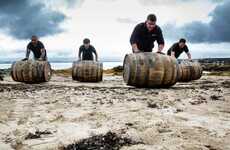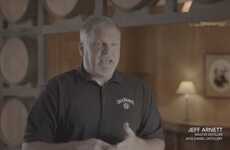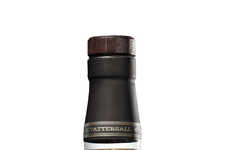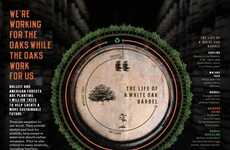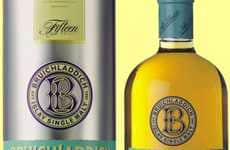
Maker's Mark Proves That Bourbon Should be Green
Going Like Sixty — January 19, 2009 — Eco
References: makersmark
Full disclosure: I am a Maker's Mark ambassador, having passed a long rigorous testing that involved consuming large quantities over long stretches, small quantities over short stretches and vice versa. I am pleased to report to Trend Hunter readers that the Maker's Mark distillery in Loretto, Kentucky is going as green as possible while still maintaining their standards of high quality using locally-grown corn and wheat from a 30-mile radius, reduced trucking carbon emissions.
Maker's Mark only uses 200 of the 620 acres of land they own. The remainder of the land is set aside for conservation and public use. Maker's Mark is unique in that they recycle the byproducts from distilling their fine golden brew.
The system they use takes the grain and water and makes it usable for generating energy.
Maker's Mark only uses 200 of the 620 acres of land they own. The remainder of the land is set aside for conservation and public use. Maker's Mark is unique in that they recycle the byproducts from distilling their fine golden brew.
The system they use takes the grain and water and makes it usable for generating energy.
Trend Themes
1. Sustainable Distilleries - Opportunity to create distilleries that prioritize sustainability by using locally-sourced ingredients and implementing recycling systems for byproducts.
2. Reduced Carbon Emissions - Innovative strategies to reduce carbon emissions in the transportation process for distilleries, leading to more eco-friendly operations.
3. Circular Economy in Distilling - Exploring ways to create a circular economy within the distilling industry by repurposing byproducts for energy generation and other uses.
Industry Implications
1. Bourbon Distilleries - Opportunity for bourbon distilleries to adopt sustainable practices and reduce their environmental impact through local sourcing and recycling systems.
2. Renewable Energy - Renewable energy sector can partner with distilleries to develop efficient systems for converting byproducts into energy, creating a mutually beneficial relationship.
3. Environmental Conservation - Collaboration between distilleries and environmental organizations to preserve land for conservation and public use, while maintaining high-quality distillery operations.
1.6
Score
Popularity
Activity
Freshness

